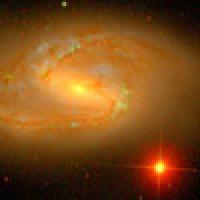
Browse with Plus: The scale of the Universe
How big is the Universe? And how small is the smallest thing within it? This cute website developed by Cary Huang puts things into perspective. It lets you explore the entire range of scales, from the smallest length (the Planck length) all the way up to the entire Universe, via atoms, people, giant earthworms, planets, galaxies and more.
http://www.primaxstudio.com/stuff/scale_of_universe/
Read more about...
Anonymous
Lovely!
All the numbers in this are written in the opposite order from what I'm used to (e.g. 10^6 x 4.2m as the distance across the US). Is that the convention in some places?
Anonymous
No the author just wants to be different from everybody else and decided to invert the element order of the scientific notation that is:
-> (real number coeficient) +- (real number error) x base(integer usually 10) ^ exponent(integer)
Anonymous
No - I think it's to emphasize the scale - the power of 10 is more significant than the coefficient (which allows for relative scale within any given power of ten).
Anonymous
Hi, this is a very interesting web page and I have enjoyed reading many of the articles and posts contained on the website, keep up the good work and hope to read some more interesting content in the future. Thank you so much.